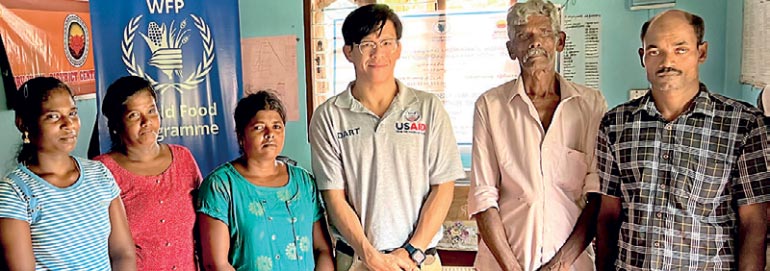Saturday Feb 21, 2026
Saturday Feb 21, 2026
Tuesday, 20 December 2022 02:33 - - {{hitsCtrl.values.hits}}

Dustin Shiau with a group of people in Mullaitivu, who received cash assistance from WFP through USAID funding
The United Nations World Food Program (WFP) in Sri Lanka welcomed US Agency for International Development (USAID)’s Bureau for Humanitarian Assistance (BHA) Senior Regional Program Officer Dustin Shiau, on a visit to Sri Lanka.
He met with food-insecure communities and heard first-hand accounts of the difficulties they are facing and how USAID and WFP support has helped provide regular meals for their families.
During his visit, Shiau met with communities from Mullaitivu in the North of Sri Lanka, who are among those worst affected by the economic crisis – including pregnant and breastfeeding mothers and people with disabilities – to better understand their nutritional needs.
This year, the US has provided a record total $ 20 million (approximately Rs. 7.3 billion) to support WFP’s response to the economic crisis in Sri Lanka. Of that, USAID’s most recent contribution of $ 13 million (approximately Rs. 4.7 billion) is providing cash assistance and food rations to families hard-hit by the economic crisis across the country. USAID also donated funds to WFP to help feed children enrolled in the national school meal program.
“The United States of America is a significant contributor to WFP’s emergency operation in Sri Lanka and the single largest donor to WFP globally,” said WFP Sri Lanka’s Representative and Country Director Abdur Rahim Siddiqui.
“We are immensely grateful for the contribution from USAID’s Bureau for Humanitarian Assistance which has enabled us to swiftly expand our emergency operation, so we can help more people access regular, nutritious meals. We welcome Shiau’s visit to Sri Lanka where he has witnessed how valuable USAID’s contribution is to food-insecure communities.”
According to the latest WFP surveys, seven out of 10 households are adopting negative coping strategies – such as limiting portion sizes or skipping meals altogether – to deal with high food prices and reduced incomes. The US funding comes at a critical time to help safeguard these communities and prevent them from adopting potentially damaging coping strategies.
USAID’s long-time support to WFP and the Government of Sri Lanka includes disaster risk reduction initiatives related to floods and landslides.
During his visit, Shiau participated in a live demonstration of a mapping exercise in Moratuwa – an area susceptible to weather-related natural disasters – to understand the process by which authorities use Geographic Information System (GIS) software to identify where the most vulnerable communities may be hardest-hit during an emergency.
With support from donors like the US, WFP is rapidly scaling up its emergency operation – which commenced in June – with plans to provide food and nutrition assistance to 3.4 million people. WFP has so far reached over one million people with cash, food and vouchers and through the national school meal program.